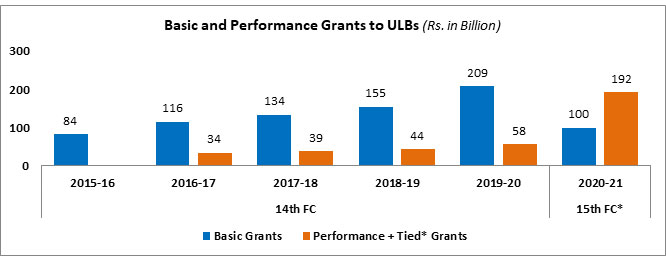The 15th Finance Commission has made significant departures from the previous Central Finance Commissions in its recommendations for urban local governments, in its interim report for 2020-21. In this post, Mehta and Mehta highlight these and provide some suggestions for consideration in the final report, especially with regard to increasing allocation for sanitation, and making available more untied funds for urban local governments to enable them to meet exigencies of Covid-19-like situations.
The Fifteenth Finance Commission’s (15th FC) ‘interim report’ for the year 2020-21 was made available in public domain on 1 February 2020. Most of the suggestions made in the report for local governments have been accepted by the Ministry of Finance. However, in light of the global Covid-19 pandemic and the tireless efforts of local government officers both in cities and rural areas, we hope that the 15th FC will revise its recommendations in their final report.
Covid-19 is unprecedented. While our health workers have been at the forefront of efforts to save lives, there are scores of local workers, who have been also working endlessly to keep our villages and cities clean and healthy. India has probably the largest number of local self-governments anywhere in the world – nearly 250,000 village panchayats and around 4,500 urban local bodies. In the current battle against Covid-19, the entire staff of urban local governments – from commissioners to sanitation workers – are involved in a range of activities to ensure that during the lockdown period, all municipal services are provided to urban residents. This is often at the risk of their health, as we recently found in Mumbai where a sanitation worker tested positive for Covid-19.
For the urban local governments, this report has made important and significant departures from the previous Central FCs. This post aims to highlight these and provide some suggestions for consideration in the final report, especially with regard to increasing allocation for sanitation, and making available more untied funds for urban local governments to enable them to meet exigencies of Covid-19-like situations.
Increased allocations to local governments and urban local bodies
It is good that the 15th FC has stepped up allocations for local governments to 4.3% of the divisible pool, as against 3.5% recommended by the 14th FC for 2019-20, and 2.5% recommended by the 13th FC.1 The 13th FC had also acknowledged the need for providing local bodies with a predictable and buoyant source of revenue. It is good to see the 15th FC taking a similar stand. We do hope that in its final report this will be stepped up to 5% of the divisible pool.
The total grants recommended by the 15th FC for urban local bodies (ULBs) for 2020-21 are Rs. 292.5 billion against Rs. 266.65 billion recommended for 2019-20 by the 14th FC. These increases are welcome and in the right direction. The 15th FC has made a very good beginning with this interim report, and we look forward to further increases for ULBs in the final report. We, however, hope that this shift towards higher proportion of ‘tied grants’ (conditional grants), to ULBs is reconsidered in the final report.
Figure 1. Finance Commission grants for local governments
The missing focus on sanitation
In a major departure from the previous two FCs that provided 80% of ULB grants as ‘untied grants’2, the 15th FC has made all the grants to the million-plus cities as conditional, and 50% of the grants to other cities as conditional. This is, to some extent, in line with the terms of reference pertaining to local governments for the 15th FC, which read, “Provision of grants in aid to local bodies for basic services, including quality human resources, and implementation of performance grant system in improving delivery of services.” (p. 3).
In this context, it is good to know that the 15th FC has tied most of the ULB grants for the smaller cities with improvement in basic services, such as drinking water, solid waste management, and water conservation. However, it has missed out an important component of sanitation – faecal sludge and septage management (FSSM). This is essential to ensure safely managed sanitation in all cities to meet the Sustainable Development Goals (SDGs) to which the Government of India is a signatory. Ministry of Urban Development’s (MOUD) 2017 ‘National Policy for FSSM’ also recognised this explicitly.
It is well known that less than 10% of the 4,000+ statutory cities in India, have a sewerage system. More than 45% of urban households are estimated to depend on on-site sanitation systems – toilets connected to septic tanks, pits, etc. (MOUD, 2017). For safely managed sanitation, these cities will require implementation of city-wide FSSM plans of services for regular desludging of septic tanks and treatment of the faecal sludge and septage. While the 15th FC has included improvement of ambient air quality, drinking water, and solid waste management in its conditionality, it has completely disregarded this important aspect of FSSM, particularly for smaller cities.
Conclusion
In their efforts to “empower local governments”, the 15th FC has made more funds available to ULBs, but bulk of these are as tied grants. Making two-thirds of the grants to ULBs as tied grants is quite in contrast with the approach of previous Central FCs, and goes against the spirit of empowering local governments.
Most cities in India face severe shortages of PPEs (personal protective equipment) for sanitation workers. Cities do not even have adequate funds to ensure replacement of PPEs used by sanitation workers, as required by the Ministry of Health and Family Welfare in its guidelines for handling waste from quarantined areas. Maharashtra has allowed ULBs to use the last instalment of the 14th FC grant for Covid-19 related expenditures. Would the 15th FC take this into cognisance and move away from tying up a large proportion of its grant and allow local governments the flexibility to use funds in times of public health crisis?
The 15th FC has made important recommendations regarding enhancing grant-in-aid to ULBs, and has introduced some new areas, such as improving air quality, recognising the distinct needs of large cities, and focusing on water supply services. However, given the links of public health with sanitation and particularly, FSSM for safely managed sanitation, the 15th FC should include this important dimension in its recommendations. We do hope that observations made in this post will be given due consideration in its final report.
The authors acknowledge the support of Mr. Dhruv Bhavsar for this post.
Notes:
- For 14th and 15th FC, see 15th FC report, p. 48; for 13th FC, see Table 10.4, p. 174 in 13th FC report.
- Both 13th and 14th FC provided 80% of the grants as untied grants and 20% as performance grant to those ULBs that fulfilled certain conditions.




 27 April, 2020
27 April, 2020 






Comments will be held for moderation. Your contact information will not be made public.